The long wait in Vienna
VIENNA, July 15, 2015 - «You’re still here?» It’s a sign you’ve been away a long time, when even the hotel receptionist is surprised to see you at breakfast.
That was nearly two weeks after I arrived in Vienna. And several days before the decade-long talks concluded with a landmark deal on Iran’s nuclear programme. But of course we didn’t know that at the time.
Fresh off the plane my enthusiasm to be covering the events sharply contrasted with the many journalists who had already been camped outside Palais Coburg for a week. And then there were those who had been following these talks for months, some even years.
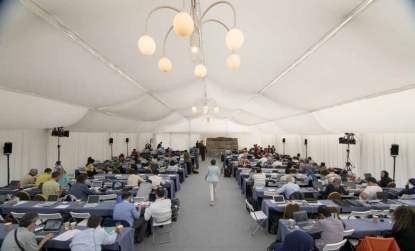 Journalists work and rest in a tent outside the Palais Coburg Hotel in Vienna on July 9, 2015 (AFP Photo / Joe Klamar)
Journalists work and rest in a tent outside the Palais Coburg Hotel in Vienna on July 9, 2015 (AFP Photo / Joe Klamar)While the daily grind was clearly taking its toll on everyone - even leaders regularly mentioned the long hours and hard work - the sense of moving toward a historic denouement kept spirits reasonably high.
So you can imagine the fall-out after the EU’s chief diplomat Federica Mogherini announced on the day of the official deadline that it wasn’t being extended – but that they were taking the extra hours they needed to complete the deal.
After that, rumours swirled on a daily basis. And conversations were dominated by when and if a deal might be reached.
The waiting game continued.
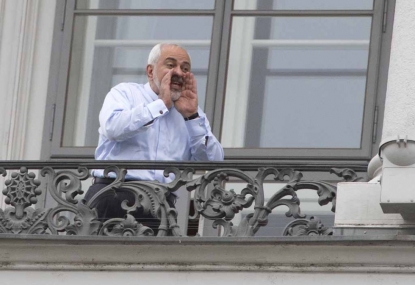 Iranian Foreign Minister Mohammad Javad Zarif shouts from a balcony of the Palais Coburg Hotel in Vienna on July 13, 2015 (AFP Photo / Joe Klamar)
Iranian Foreign Minister Mohammad Javad Zarif shouts from a balcony of the Palais Coburg Hotel in Vienna on July 13, 2015 (AFP Photo / Joe Klamar)As each day passed, the leaders themselves made regular reference to the late hours, patience and determination. Iran’s foreign minister Mohammad Javad Zarif even shouted from one of his balcony appearances that he was ‘tired and overworked’.
A particularly dispiriting moment came when a journalist asked Zarif if the deadline would be reached. He turned his eyes heavenwards and said ‘Inshallah’.
Several days after the official deadline had passed, during what’s called a round table opportunity– when the press are allowed in for 45 seconds to photograph the negotiators seated around a table, Kerry was seen to be rubbing his temples, and stony faces had replaced the usual smiles and jokes.
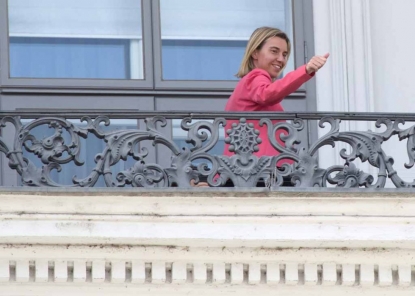 EU top diplomat Federica Mogherini gestures from the balcony of the Palais Coburg Hotel during the Iran nuclear talks in Vienna on July 13, 2015 (AFP Photo / Joe Klamar)
EU top diplomat Federica Mogherini gestures from the balcony of the Palais Coburg Hotel during the Iran nuclear talks in Vienna on July 13, 2015 (AFP Photo / Joe Klamar)The mood in the press centre grew increasingly dejected, as days passed and the same lines of ‘progress but difficulties’ were churned out.
The waiting game was punctuated by the daily delivery of ice cream to the press centre, which got journalists moving just as fast as one of Mogherini’s surprise appearances at the balcony.
During the three weeks of talks, we had worked in 40 degree heat, thunderstorms and high winds. But those ice creams were always a welcome sight.
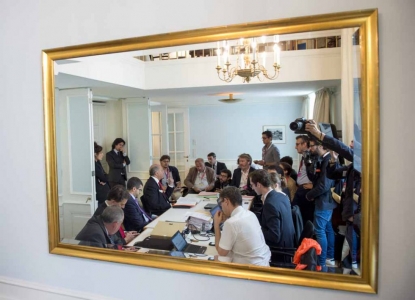 French Foreign Minister Laurent Fabius briefs journalists at the Palais Coburg Hotel on July 14, 2015 (AFP Photo / Joe Klamar)
French Foreign Minister Laurent Fabius briefs journalists at the Palais Coburg Hotel on July 14, 2015 (AFP Photo / Joe Klamar)On Monday, July 13th, almost a week past deadline date, the mood in the camp lifted. Rumours of an agreement swirled. And were readily gobbled up by tired, listless journalists.
For the first time we set up camp outside Palais Coburg into the early hours of the morning.
Then word spread that a deal had been reached with Iran, and would be formally announced the following day. Relieved by the news, most of us snatched an hour or so of sleep before gearing up for the final push.
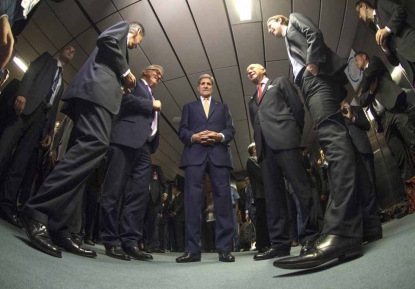 The foreign ministers of France, Germany, Britain, the United States and Austria talk prior to their final plenary meeting at the United Nations building in Vienna on July 14, 2015 (AFP Photo / Pool / Joe Klamar)
The foreign ministers of France, Germany, Britain, the United States and Austria talk prior to their final plenary meeting at the United Nations building in Vienna on July 14, 2015 (AFP Photo / Pool / Joe Klamar)Desperate to get the best spots, journalists queued outside the conference room at the UN centre in Vienna, creating a bottleneck as more reporters filed down the escalators.
It would seem that the waiting game was not yet quite over.
To capture the best shots of this historic moment, a number of photographers thoughtfully removed their shoes to stand on chairs – unfortunately engulfing the rest of us in a fug of sweaty feet.
At that point even some of the most hardened cameramen, who had stayed at the helm in all weathers outside Palais Coburg, looked desperate to abandon ship.
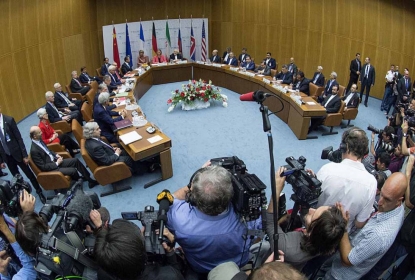 Six world powers and Iran hold a final plenary session at the United Nations building in Vienna on July 14, 2015 (AFP Photo / Pool / Joe Klamar)
Six world powers and Iran hold a final plenary session at the United Nations building in Vienna on July 14, 2015 (AFP Photo / Pool / Joe Klamar)And, at last, there was an official announcement. Members of the P5 + 1 looked satisfied if a little shell-shocked. Our final reports were filed on the historic deal, kit was packed up for the last time, and the realisation slowly sank in.
Over quite a few cold beers the AFP team, who all knew far more about uranium enrichment than could ever possibly be useful, reflected on the previous, extraordinary days and months.
Whilst relieved this landmark moment had finally come to pass, there was also a sense of loss, and a certain disappointment at the thought of returning of normality. Having anticipated this moment for so long, the cameras had left, the limelight had shifted, and the waiting game was finally over.
Helen Percival is an AFP video journalist based in London.
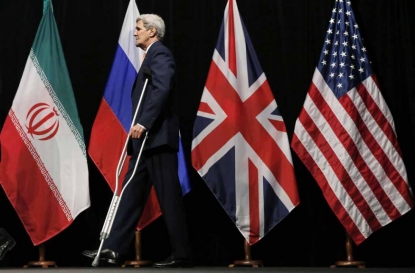 US Secretary of State John Kerry leaves the stage after posing for a picture with foreign ministers and representatives from China, Iran, Britain, Germany, France, and the EU in Vienna, Austria July 14, 2015 (AFP Photo / Pool / Joe Klamar)
US Secretary of State John Kerry leaves the stage after posing for a picture with foreign ministers and representatives from China, Iran, Britain, Germany, France, and the EU in Vienna, Austria July 14, 2015 (AFP Photo / Pool / Joe Klamar)

